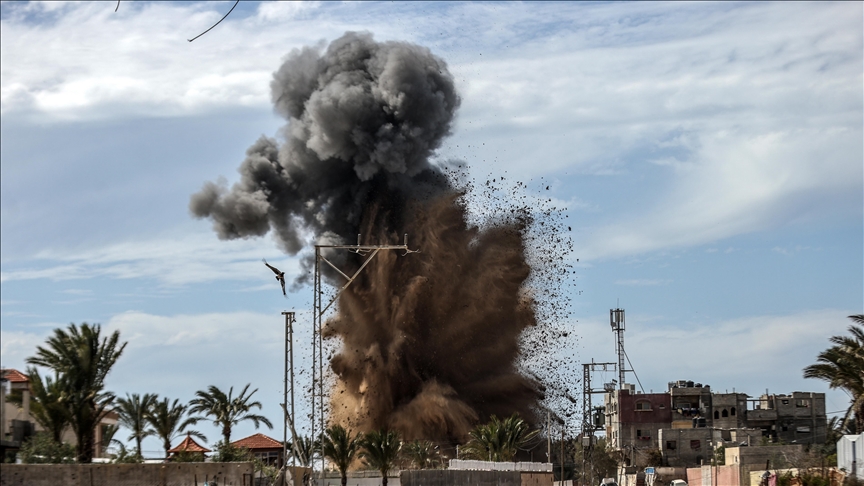Egypt, Qatar push for 60-day Gaza truce leading to permanent ceasefire
Joint statement calls for all parties ‘to exercise responsibility and support the efforts of mediators aimed at resolving the crisis in the Gaza Strip’
 Israeli attack on Gaza continue
Israeli attack on Gaza continue
ISTANBUL
Egypt and Qatar on Sunday expressed hope for a swift agreement on a 60-day temporary truce between Israel and Hamas that would pave the way for a permanent ceasefire in the Gaza Strip.
A joint statement urged all parties “to exercise responsibility and support the efforts of mediators aimed at resolving the crisis in the Gaza Strip through restoring stability and calm to the region.”
The two countries added that they continue their intensive efforts “to bring views closer and address contentious points with a view to reaching a ceasefire agreement in the Gaza Strip, based on the proposal of the U.S. President's envoy to the Middle East, Steve Witkoff, thereby enabling the resumption of indirect negotiations on the basis of this proposal.”
They also said they are “striving to swiftly reach a 60-day temporary truce, which would pave the way for a permanent ceasefire agreement in the Gaza Strip.”
The statement added that this move “would facilitate the resolution of the unprecedented humanitarian crisis in the region, enable the opening of border crossings, and allow the entry of humanitarian and relief aid to alleviate the suffering faced by the Palestinian people in Gaza.”
Cairo and Doha also noted this effort “aims to bring an end to the war entirely and initiate the reconstruction of the Gaza Strip in accordance with the plan adopted by the emergency Arab summit held in Cairo on March 4.”
Earlier Sunday, Israel’s Yedioth Ahronoth newspaper reported that Hamas’ response to Witkoff’s proposal, which the envoy labeled “totally unacceptable,” suggests the group is not yet on the brink of collapse, contrary to Israeli claims that it is under “severe pressure.”
The newspaper described Hamas' reply as “vague” and argued it contradicted assertions from Israeli officials who say the group is nearing defeat.
It added that Hamas continues to operate in small units across Gaza and views its survival as a victory. The group measures its success by global perception of the Palestinian cause, Israel’s growing international isolation—especially in Europe and parts of the US—and by increasing political divisions within Israel itself, the media outlet reported.
On Saturday night, Witkoff criticized Hamas’ latest response to his ceasefire proposal as “totally unacceptable.”
He highlighted: “That is the only way we can close a 60-day ceasefire deal in the coming days in which half of the living hostages and half of those who are deceased will come home to their families and in which we can have at the proximity talks substantive negotiations in good faith to try to reach a permanent ceasefire.”
That same day, Hamas confirmed it had submitted its official reply to the mediators. While it did not disclose the content, the group said its position was based on three goals: a permanent ceasefire, full Israeli withdrawal from Gaza, and unrestricted humanitarian access to the enclave.
Hamas has repeatedly stated it is prepared to release all Israeli captives in one exchange deal—on the condition that the war ends, Israeli forces fully withdraw from Gaza, and Palestinian prisoners are freed.
Israeli Prime Minister Benjamin Netanyahu continues to push for partial agreements and has introduced new conditions, including the disarmament of Palestinian factions.
Critics in the Israeli opposition accuse him of prolonging the war and pushing for the reoccupation of Gaza to serve his political interests and maintain power.
Rejecting international calls for a ceasefire, Israel has pursued a devastating offensive in Gaza since October 2023, killing over 54,400 Palestinians, most of them women and children. Aid agencies have warned about the risk of famine among the enclave's population.
Last November, the International Criminal Court issued arrest warrants for Israeli Prime Minister Benjamin Netanyahu and his former Defense Minister Yoav Gallant for war crimes and crimes against humanity in Gaza.
Israel also faces a genocide case at the International Court of Justice for its war crimes against civilians in the enclave.








